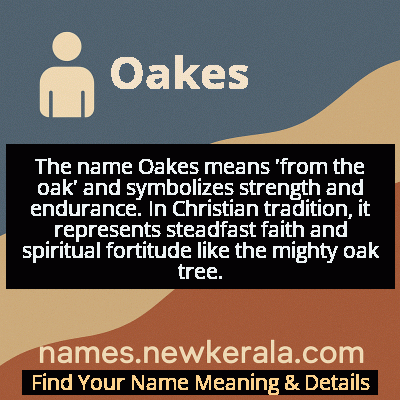Oakes Name Meaning & Details
Origin, Popularity, Numerology Analysis & Name Meaning of Oakes
Discover the origin, meaning, and cultural significance of the name OAKES. Delve into its historical roots and explore the lasting impact it has had on communities and traditions.
Name
Oakes
Gender
Male
Origin
Christian
Lucky Number
6
Meaning of the Name - Oakes
The name Oakes means 'from the oak' and symbolizes strength and endurance. In Christian tradition, it represents steadfast faith and spiritual fortitude like the mighty oak tree.
Oakes - Complete Numerology Analysis
Your Numerology Number
Based on Pythagorean Numerology System
Ruling Planet
Venus
Positive Nature
Harmonious, responsible, caring, and artistic.
Negative Traits
Overly idealistic, superficial, possessive, or jealous.
Lucky Colours
Pink, turquoise.
Lucky Days
Friday.
Lucky Stones
Diamond, turquoise.
Harmony Numbers
2, 3, 9.
Best Suited Professions
Artists, musicians, teachers, healthcare workers.
What People Like About You
Warmth, nurturing nature, artistic flair.
Famous People Named Oakes
Sir Herbert Oakes
British Colonial Administrator
Served as Governor of the Bahamas and played significant roles in British colonial administration
John Oakes
American Religious Leader
Prominent figure in the Churches of Christ movement and influential religious educator
Richard Oakes
Native American Activist
Key leader in the Occupation of Alcatraz and advocate for Native American rights
Sir Sydney Oakes
British Army Officer
Distinguished military career and recipient of the Distinguished Service Order
Name Variations & International Equivalents
Click on blue names to explore their detailed meanings. Gray names with will be available soon.
Cultural & Historical Significance
Historically, the name gained prominence during the Middle Ages when surnames based on natural features became common. Families living near prominent oak trees or oak forests often adopted the name, and it gradually transitioned to Christian given name usage, particularly among English-speaking communities. The oak's association with royalty and nobility—from the Royal Oak that saved King Charles II to its use in heraldry—further elevated the name's status. In American history, the name carries additional significance through figures like Richard Oakes, who connected the name's strength symbolism with Native American activism and civil rights movements.
Extended Personality Analysis
Individuals named Oakes are typically perceived as possessing a strong, grounded character reminiscent of the oak tree from which the name derives. They often exhibit natural leadership qualities, reliability, and a steadfast nature that others find comforting and trustworthy. These individuals tend to be deeply principled, with a strong moral compass and the courage to stand by their convictions even in challenging circumstances. Their strength is not merely physical but manifests as emotional resilience and mental fortitude, enabling them to weather life's storms with remarkable composure.
Beyond their obvious strength, Oakes often possesses a quiet wisdom and protective nature. They are typically the pillars of their communities or families—the people others turn to in times of crisis. While they may appear reserved initially, they develop deep, lasting relationships built on loyalty and mutual respect. Their practical approach to problem-solving and ability to think long-term makes them excellent planners and decision-makers. However, this same steadfastness can sometimes manifest as stubbornness or resistance to change, as they prefer well-established methods and traditions over untested innovations.
Modern Usage & Popularity
In contemporary times, Oakes has experienced a resurgence as a distinctive given name, particularly among parents seeking nature-inspired names with strong traditional roots. While not among the most popular names, it has gained steady attention in English-speaking countries, especially the United States, United Kingdom, and Australia. The name appeals to modern parents who appreciate its connection to nature, its strong phonetic qualities, and its ability to stand out without being overly unconventional. Current naming trends show increased usage of surname-names and nature names, both of which categories Oakes fits perfectly. It maintains a sophisticated yet approachable quality that works well in professional contexts while retaining its natural, earthy appeal.
Symbolic & Spiritual Meanings
The symbolic meaning of Oakes is deeply intertwined with the mythology and cultural significance of the oak tree across civilizations. Symbolically, it represents unwavering strength, endurance through adversity, and deep-rooted stability—much like the oak that withstands storms through its strong foundation. In metaphorical terms, the name evokes protection and shelter, as the oak has historically provided refuge and shade. It also symbolizes wisdom and longevity, given the oak's remarkable lifespan and its association with ancient knowledge in Celtic and Druidic traditions. The acorn-to-oak transformation represents potential and growth, suggesting that those named Oakes possess inherent capabilities that develop magnificently over time. In Christian symbolism, the oak frequently represents faith, virtue, and God's steadfast love, making the name particularly meaningful in religious contexts.

